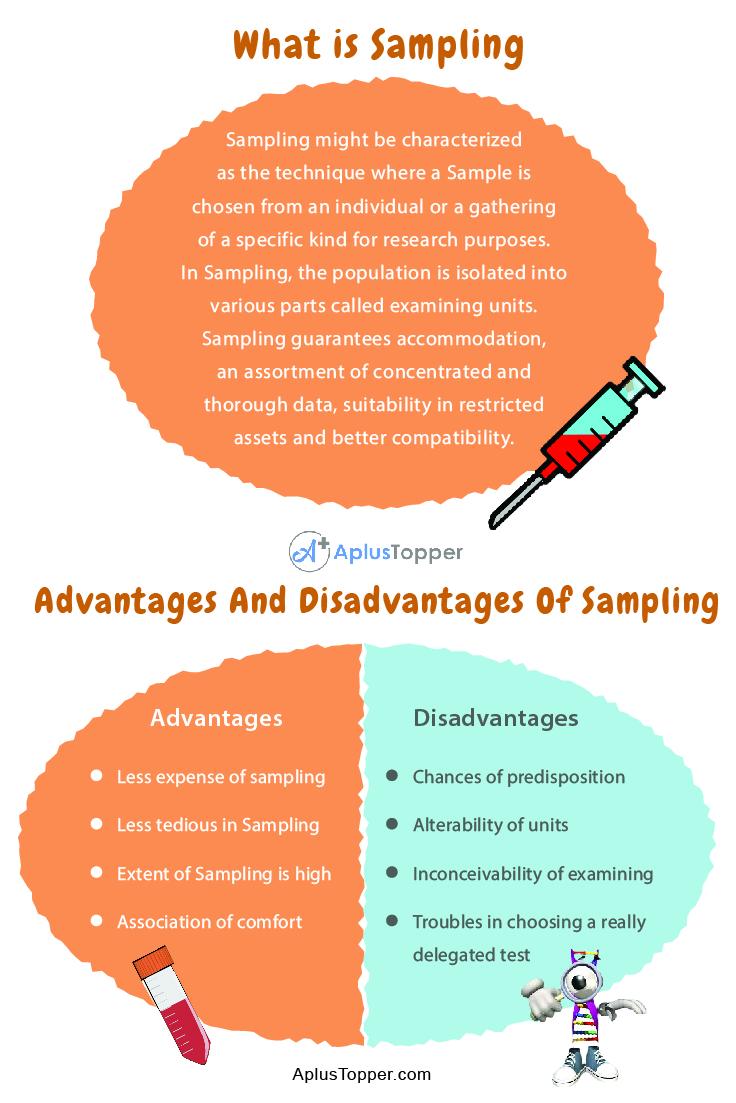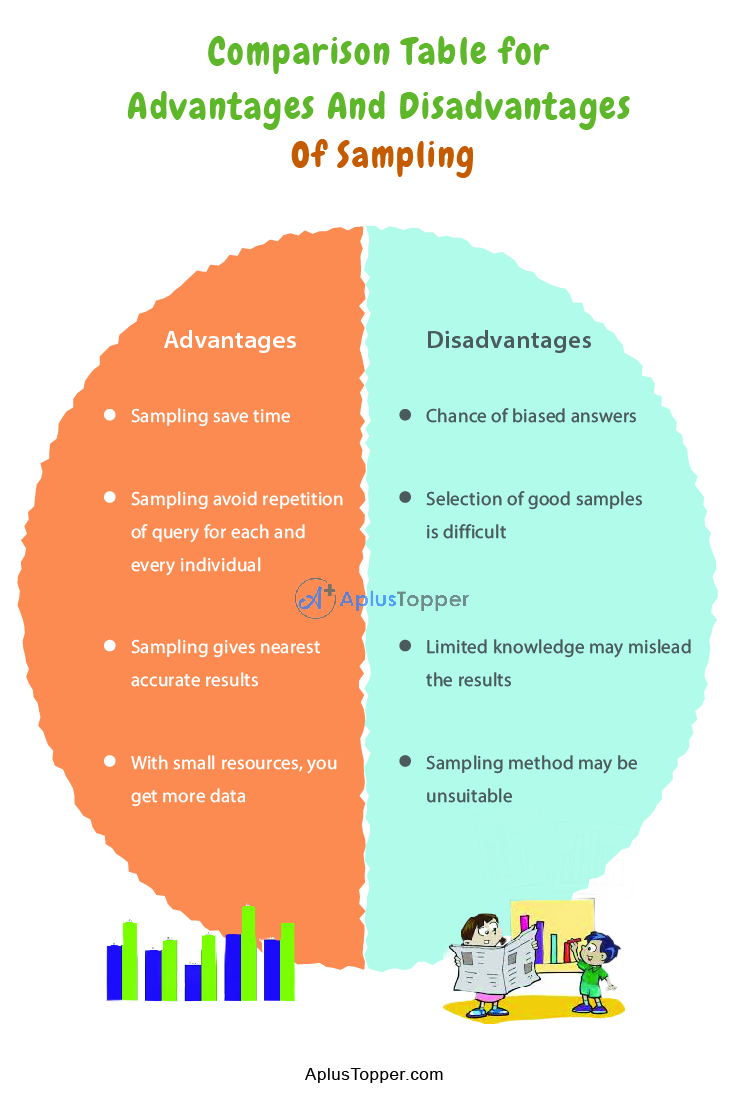Advantages And Disadvantages Of Sampling: Sampling is an extraordinary apparatus on the off chance that you need to manage an immense volume of information and you have restricted assets. At the point when you have a huge population of information, then, at that point, it can likewise be the main choice you have.
Despite the fact that you don’t expose every one of the information to your questions, the opportunity that you obtain the ideal outcomes is practically like that when you do intensive checking. Given that your decision on the Sampling strategies should be proper.
Students can also find more Advantages and Disadvantages articles on events, persons, sports, technology, and many more.
Utilization of specific questions to under 100 percent of the population(group of all things that we are attempting to notice and break down) is known as Sampling. In straightforward terms, Sampling is the course of determination of the set number of components from a huge gathering of components (population) so that, the qualities of the Samples taken is indistinguishable from that of the population.
What is Sampling? Advantages And Disadvantages Of Sampling 2022
Sampling might be characterized as the technique where a Sample is chosen from an individual or a gathering of a specific kind for research purposes. In Sampling, the population is isolated into various parts called examining units.
Sampling guarantees accommodation, an assortment of concentrated and thorough data, suitability in restricted assets and better compatibility. The unwavering quality of the Sample relies on the propriety of the examining strategy utilized. The motivation behind Sampling the hypothesis is to make examining more productive. However, the genuine challenges lie in determination, assessment and organization of tests.
In this article, we will discuss the advantages and disadvantages of sampling in this article.
- Advantages of Sampling
- Disadvantages Of Sampling
- Comparison Table for Advantages And Disadvantages Of Sampling
- FAQs on Pros and Cons of Sampling
Advantages of Sampling
- Less expense of sampling: If information somehow managed to be gathered for the whole population, the expense will be very high. A Sample is a little extent of a population. In this way, the expense will be lower assuming the information is gathered for a Sample of the population which is a major benefit.
- Less tedious in Sampling: Utilization of Sampling takes less time too. It consumes less time than the evaluation method. Arrangement, examination and so forth, take significantly less time on account of a Sample than on account of a population.
- Extent of Sampling is high: The specialist is worried about the speculation of information. To concentrate on an entire population to show up at speculations would be illogical. A few populations are huge to the point that their attributes couldn’t be estimated. Before the estimation has been finished, the population would have changed. However, the most common way of examining makes it conceivable to show up at speculations by concentrating on the factors inside a moderately little extent of the population.
- Exactness of information is high: Having drawn a Sample and figured out the ideal graphic measurements, it is feasible to decide the security of the got test esteem. A Sample addresses the population from which it is drawn. It allows a serious level of precision because of a restricted area of activities. In addition, cautious execution of fieldwork is conceivable. Eventually, the consequences of Sampling concentrates on end up being adequately exact.
- Association of comfort: Hierarchical issues engaged with Sampling are not many. Since the test of a little size, immense offices are not needed. Examining is in this manner affordable in regard to assets. Investigation of tests includes less space and hardware.
- Escalated and thorough information: In Sample studies, estimations or perceptions are made of a predetermined number. Along these lines, escalated and thorough information is gathered.
- Reasonable in restricted assets: The assets accessible inside an association might be restricted. Concentrating on the whole universe isn’t feasible. The population can be acceptably covered through Sampling. Where restricted assets exist, utilization of Sampling is a fitting technique while directing promoting research.
Disadvantages Of Sampling
- Chances of predisposition: The genuine constraint of the examining technique is that it includes one-sided choice and in this manner drives us to reach incorrect determinations. Inclination emerges when the technique for choice of test utilized is broken. Relative little Samples appropriately chosen might be substantially more dependable than huge Samples ineffectively chosen.
- Troubles in choosing a really delegated test: Hardships in choosing a genuinely delegated test produces solid and precise outcomes just when they are illustrative of the entire gathering. Choice of a genuine agent test is troublesome when the peculiarities under review are of an intricate sort. Choosing great Samples is troublesome.
- In satisfactory information in the subject: Utilization of examining strategy requires sufficient subject explicit information in the Sampling method. A sampling includes factual examination and estimation of likely blunders. Whenever the analyst needs specific information in Sampling, he might submit genuine errors. Thusly, the aftereffects of the review will be misdirected.
- Alterability of units: Whenever the units of the population are not inhomogeneous, the Sampling procedure will be informal. In examining, however, the quantity of cases is little, it isn’t simple 100% of the time to adhere to the, chosen cases. The units of the test might be broadly scattered. A portion of the instances of the test may not help out the analyst and some others might be blocked off. Due to these issues, every one of the cases may not be taken up. The chosen cases might need to be supplanted by different cases. Variability of units holds up traffic of consequences of the review.
- Inconceivability of examining: Inferring a delegate test is troublesome when the universe is excessively little or excessively heterogeneous. For this situation, registration study is the main other option. Additionally, in examinations requiring an exceptionally exclusive expectation of precision, the Sampling strategy might be unsatisfactory. There will be chances of mistakes regardless of whether tests are drawn most cautiously.

Comparison Table for Advantages And Disadvantages Of Sampling
| Advantages of Sampling | Disadvantages of Sampling |
| Sampling save time | Chance of biased answers |
| Sampling avoid repetition of query for each and every individual | Selection of good samples is difficult |
| Sampling gives nearest accurate results | Limited knowledge may mislead the results |
| With small resources, you get more data | Sampling method may be unsuitable |

FAQs on Pros and Cons of Sampling
Question 1.
What is purposive sampling?
Answer:
A purposive sample is a place where a specialist chooses a Sample in view of their insight regarding the review and population. The members are picked in view of the reason for the Sample, consequently the name. Each subtype of purposive Sampling enjoys its own benefits and inconveniences. By and large, one significant benefit of this sort of examining is that it’s more straightforward to make speculations about your Sample contrasted with, say, an irregular Sample where not all members have the trademark you are contemplating.
Question 2.
What are the advantages of sampling?
Answer:
Sampling saves time by and large by lessening the volume of information. You don’t go through every one of the singular things. Sampling Avoids dreariness in works. You don’t need to rehash the inquiry and again to every one of the singular information. Whenever you utilize legitimate techniques, you are probably going to accomplish a more elevated level of precision by utilizing examining than without involving Sampling now and again because of a decrease in tedium, information taking care of issues and so on
